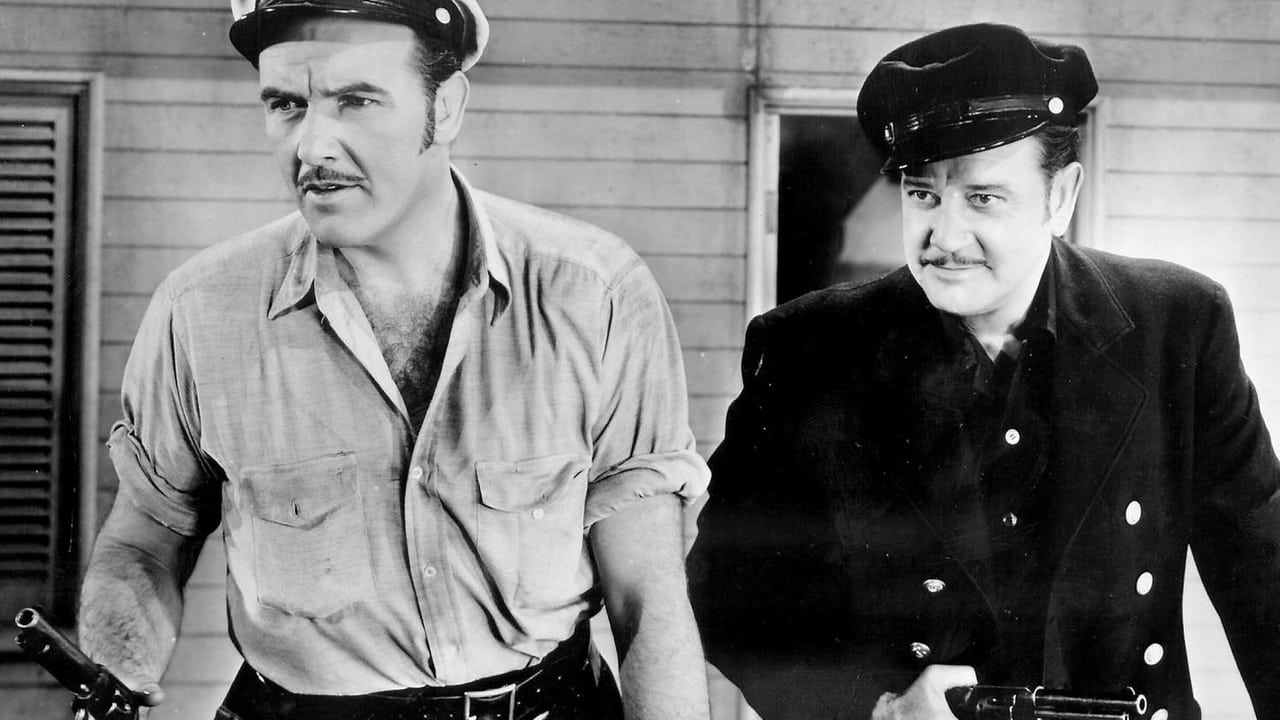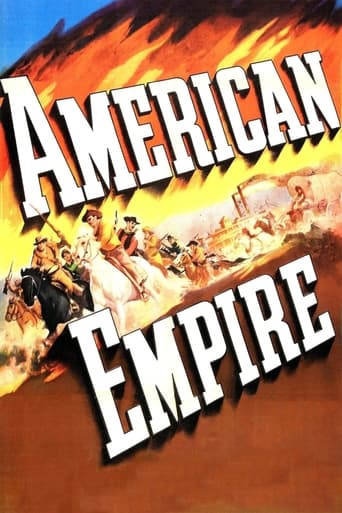

For what remained of his lengthy screen career, Richard Dix was always overshadowed by his work in Cimarron (1931). As a further example of this fact, this 13 December 1942 release, produced by Harry "Pop" Sherman, can be seen as a later attempt to cash in on Dix's self-sustaining image. American Empire was a surprisingly elaborate production by Pop's standards, and the New York Times reviewer astutely noted that Sherman "has climaxed an otherwise well-behaved drama with a reel that explodes in all directions." (In fact, the rest of the drama was far too sedate, far too well-behaved and far too over-primed with dull "additional dialogue" in my opinion).Anyway, after appearing as the Indian hero of The Vanishing American (1925), Dix had quite a career in the western film genre. He was Joaquim Murietta in The Gay Defender (1928) and an Indian again in Redskin (1929). After the award-winning Cimarron, resolute Richard performed similar chores in The Conquerors (1932). RKO then starred Dix as Pecos Smith in Zane Grey's West of the Pecos (1934), as a marshal in The Arizonian, and as a miner in Yellow Dust (1936). Dix then turned to comedy as a washed-up cowboy star in Columbia's It Happened in Hollywood (1936). However, Dix returned to his established form in Republic's expansive Man of Conquest (1939), playing the greatly admired Texas hero, Sam Houston. Moving on into the forties, Dix was an Oklahoma Territory marshal in Cherokee Strip (Paramount, 1940), a rancher in The Roundup (Paramount, 1941), and received special billing as Wild Bill Hickok in Badlands of Dakota (Universal, 1941). Next up, he impersonated Wyatt Earp in Tombstone, the Town Too Tough to Die (Paramount, 1942), became a gunfighter in Buckskin Frontier (United Artists), and followed up as a marshal in his final western, The Kansan (United Artists, 1943). Although first-billed in American Empire (and given more than his share of boring additional dialogue), Dix actually has the second lead. He even disappears from the plot for a spell halfway through and then re-appears to save the day at the elaborately staged, thrill-a-second climax. Although billed third, it's the boring Preston Foster who takes the reins in Dix's absence. As for Leo Carillo, he enacts his role with his usual strenuously unfunny "comic" accent even though he plays the villain. In real life, Carillo spoke in the same, quietly measured tones as Ronald Reagan. He was in fact an extremely rich man. Acting was his hobby. You'll notice I've not said anything about Frances Gifford, and that's because there's really nothing you can say about her. She's competent, but makes little impression. Alas, Cliff Edwards and "Big Boy" Williams try to take up the slack. They're given plenty of dull dialogue to cut their teeth on, but neither of them are equal to the task of making what issues from their mouths sound the least bit interesting.Fortunately, however, as noted above, that last reel is a whopper full of great stunts and other action and well worth waiting for!
... View MoreThere are buffs who signal American EMPIRE as an unusual and likable western; they are right about a degree of relative originality. Nicely paced, this flick is pretty well made. The plot isn't very interesting, and it's not an exciting and lively movie; but it looks better than the regular westerns of those times. I'm kind of a fan of this movie. As a genre, American EMPIRE isn't as a matter of fact a western, but a melodrama; a ranch melodrama.Gracelessly played by the two aging male leads (the distinguished and oldie Preston Foster and Richard Dix), this charming light ancient comedy manages, for a little while, before it quickly turns into romance, some kind of a screwball western—or western screwball; which would of been interesting to follow on, but, as I said, they traded screwball for romance. The action begins in the aftermath of the civil war. Two boatmen, Bryce and Taylor, turn into ranch-men. They sailed, they ride, now they have a cattle ranch. A sister for one of them means a lover for the other.Then we are, with our Texans, in 1874. Bryce (played by Preston Foster), now a family man and a powerful owner of cattle, has become a heartless guy; in his individualism, he even opposes progress as represented by the railroad, he believes only in the sharpest concurrency, he concedes nothing. Even his relatives resent him.Bryce's wife is played by the hot Frances Gifford, some girl .What is the American EMPIRE? Bryce's ranch.The scene of the firewall is awesome.The folks depicted in these naive ancient westerns are usually _asexualized, generous and decent, conventionally horny sometimes.The title of Cristian Ciopron's review should not mislead—the characters leave the river—for cattle, love and family—quite early in the movie.
... View MoreA pretty decent movie about life on the Texas-Louisiana border in the years immediately following the US Civil War. Richard Dix and Preston Foster play Dan Taylor and Paxton Bryce. As the movie opens, they're former Confederate blockade runners running a river boat carrying freight up and down the Sabine River. They run into Dominique Beauchard (Leo Carillo), an unscrupulous Louisiana cattle rancher who rounds up loose cattle in chaotic post-war Texas and runs them across the river to Louisiana. Taylor and Bryce realize the potential of cattle ranching and so give up their riverboat and start buying up land in Texas. This becomes the start of their "American Empire." Foster is really the key to the movie. Dix may receive top billing, but all he does is play off Foster. Foster's Bryce is the character who changes and grows. He has his big dream, gets married to Bryce's sister (Frances Gifford) and they have a son (Merrill Rodin) and heir to the empire. But along the way Bryce changes. Building the empire becomes all that counts. He clashes with the other ranchers in the area by refusing to let them run their cattle over his land, and he blocks progress that would have benefited them all by refusing permission for a railway right of way across his land. The end result is ongoing conflict between Foster and the ranchers, and even between Foster and Taylor, who doesn't like Bryce's way of doing business. Eventually, even his family life falls apart because of his greed. In the midst of it all Beauchard doesn't disappear but remains a thorn in Bryce's side. Providing a few chuckles throughout are the exchanges between Sailaway (Guinn Williams) and Runty (Cliff Edwards), who work for Taylor and Bryce on both the riverboat and at the ranch.All this leads up to a pretty good gunfight at the end (which is really the only extensive gunfight in the movie) and, of course, to Bryce's eventual redemption and reconciliation with those he's pushed away. It all works pretty well. It's obviously a lower budget type of movie and there's nothing fancy about it, but it's good fun and pretty quick. 6/10
... View More"American Empire" is another of a series of modestly budgeted features produced by Harry "Pop" Sherman, who also was responsible for the highly successful Hopalong Cassidy series. This one deals with the emergeance of the cattle ranches in Texas in the years following the Civil War. Two soldiers of fortune, Dan Taylor (Richard Dix) and Pax Bryce (Preston Foster) are ruuning a freight business from their riverboat. One day they meet up with the unscrupulous Dominique Beauchard (Leo Carillo) who is driving cattle to his home state of Louisiana. The boys agree to transport the cattle to their destination for a set fee. When Beauchard fails to pay up they keep the cattle and decide to go into the cattle ranching business. Into the mix comes Taylor's sister Abby (Frances Gifford) with whom Bryce falls in love and marries. They soon have a son Pax Jr. (Merrill Rodin) and Pax Sr. becomes more and more ambitious as time goes on, much to the chagrin of his partner Dan. He has angered the smaller ranchers by refusing them permission to drive their cattle across his land. The ranchers decide to stampede the cattle through but Pax Jr. is killed in the stampede. Bryce becomes distraught and decides to erect barb wire fences around the ranch which forces Dan to dissolve their partnership. All this is resolved at the end when all realize that progress must prevail over the ambitions of one man. Also in the cast are Guinn "Big Boy" Williams and Cliff Edwards as the comic relief, Jack LaRue and Chris-Pin Martin as Carillo's henchmen, and veterans William Farnum and Hal Taliaferro in other roles. Foster is really the star of the movie despite being billed third. He delivers a solid performance. Dix, who was top billed, is really only a supporting player. Gifford looks lovely as the heroine. The action is well staged and there's one dandy of a gunfight at the climax of the film. A good western.
... View More